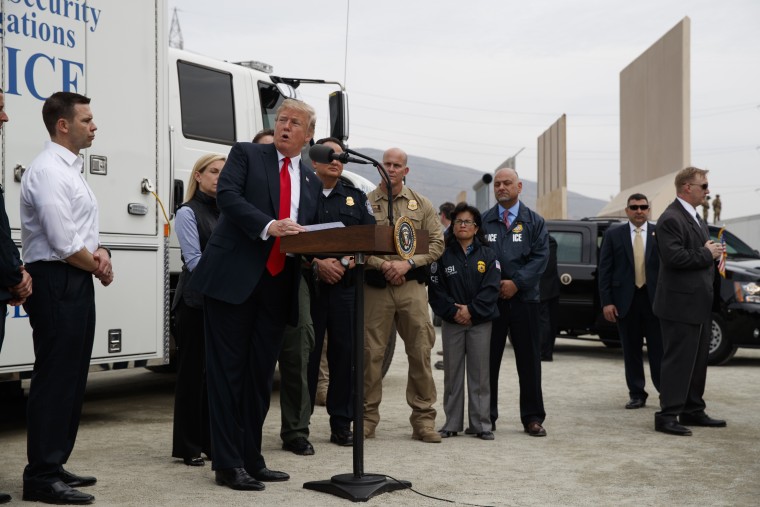On Friday afternoon, Donald Trump boasted that U.S. officials have "apprehended more people [at the U.S./Mexico border] than we have in many, many years." That wasn't even close to being true: apprehensions at the southern border are actually at historic lows.
It's the sort of detail a president obsessed with border security probably ought to know.
Yesterday, in remarks to the nation's governors, Trump went quite a bit further.
"The human trafficking is a tremendous problem where, mostly women, and they're tied up and they're taped up, and they're put in the back of cars, and the car does not come through the port of entry."
He still doesn't understand what human trafficking is.
"Ninety percent of the drugs don't come through the port of entry. Ninety percent of the drugs and the big stuff goes out to the desert, makes a left, and goes where you don't have any wall."
Nope. According to the Trump administration, Trump's rhetoric is demonstrably wrong. The facts are politically inconvenient for the Republican president, but reality is stubborn.
"You know, they'd like me to call it a barrier. It's a wall."
No, it's a fence -- and according to what Trump said when he was a candidate, we're supposed to appreciate the differences.
"I told Guatemala and I told Honduras, and I told El Salvador -- three places where they send us tremendous numbers of people -- and they're rough people. They're not sending us their finest. It doesn't make sense. Why would they send their finest? They're sending us some very -- as I would sometimes say -- rough hombres. These are rough, rough, tough people. Many criminal people."
That's not how any of this works.
"I expect to have 250 to 300 miles of wall built in the very near future. Secretary Nielsen is here right now, and we have -- we will shortly have about 200 miles under construction."
No, he won't. Trump is just making up numbers.
"They have the traffickers. They're vicious, they're smart -- the coyotes. How about the name 'coyote'? They have people tied up, put in the back of trucks and vans. They can't go through checkpoints. They have to go through open areas. Can't walk through. You can't go through it. Because even if they don't do much of an inspection of your truck or your car, they do open the back door, or they do look through a window. You can't have women sitting there that are tied up."
This was wrong the first time he brought it up in his speech, and it was equally wrong the second time.
Sifting through the remarks, I tried to find border-related claims that weren't made up. It was quite difficult.
But the larger point isn't just about fact-checking; it's also about the nature of the policy debate. If he believes his own rhetoric -- a distinct possibility -- he's in a fantasy world of his own creation.
The practical implications of this matter. As we discussed several weeks ago, after Trump peddled obvious nonsense during a meeting with several members of Congress, the president has made it impossible to negotiate with him on one of his signature issues.
Even if his rivals could trust him (they can't), and even if Trump were willing to be consistent (he isn't), working on a deal with the president would require him to have some basic understanding of the relevant policy details.
But that's plainly not the case.
